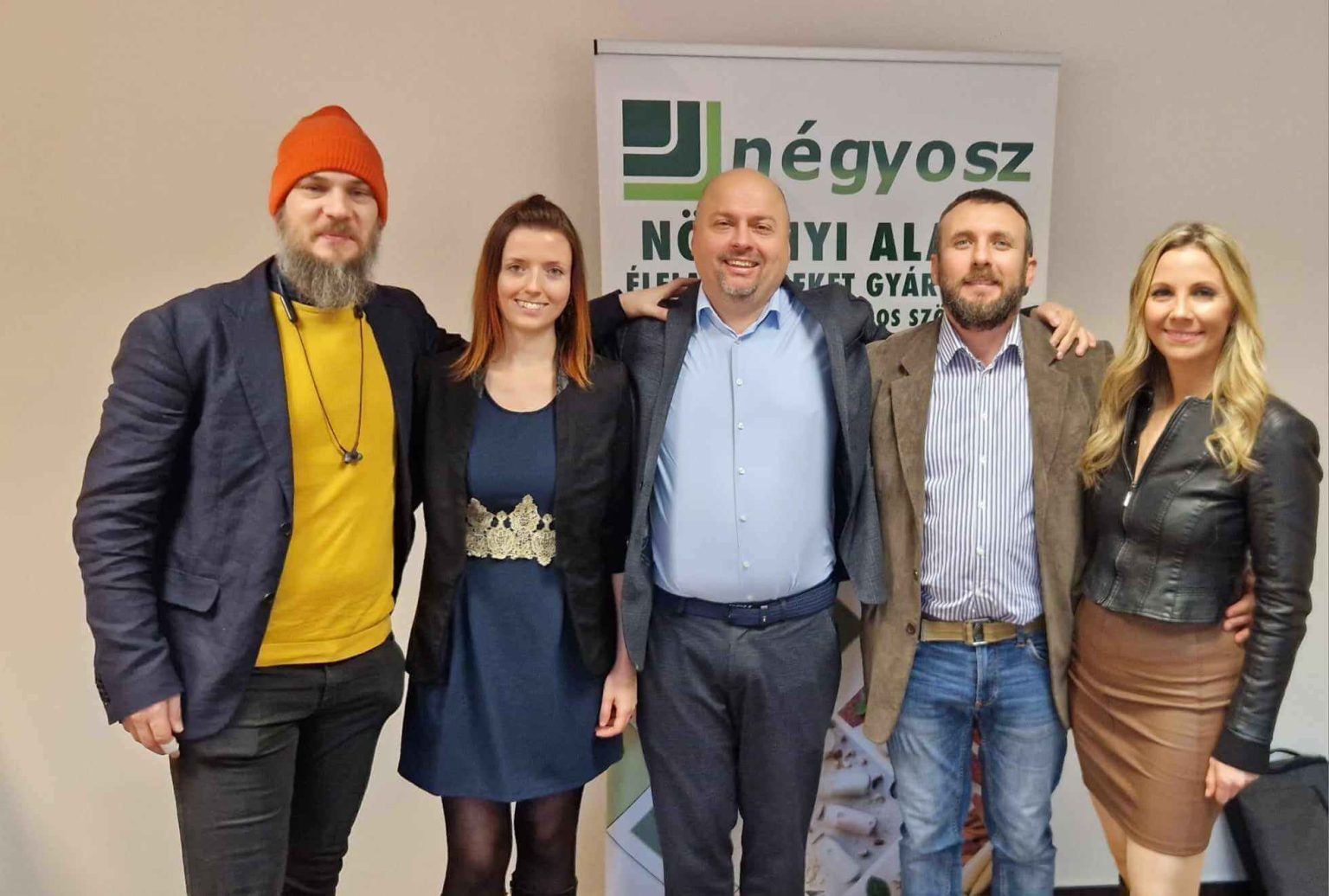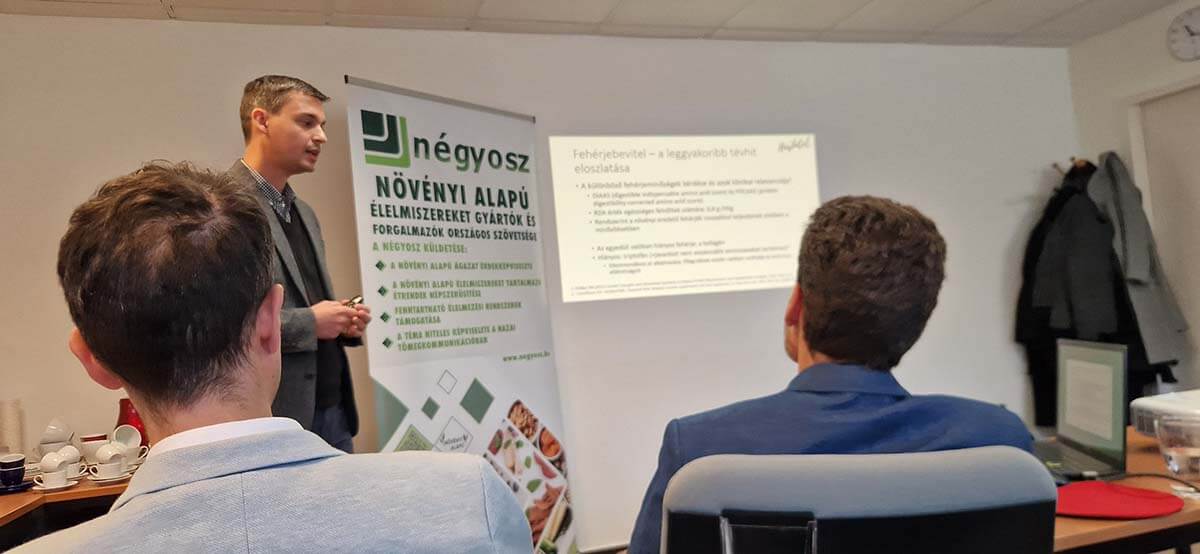
Inspiring presentations and big lessons learned at the Conference on Building Sustainable Food Systems
On Thursday, 9 November, we held the Conference on Building Sustainable Food Systems.
It was a major milestone for plant food advocacy, with important messages delivered, great insights shared with the audience and many new contacts made by all who attended. All the presentations were almost endlessly interesting, but we would like to draw attention to the research of NÉGYOSZ, the results of which were also presented at the conference – with instructive details.
This blog article is longer than usual, but it’s worth a read!
Let’s see what presentations were given:
Legal environment, international developments
In her presentation, Réka Szöllősi, independent food expert and consultant, pointed out that more sustainable food is not only a solution to environmental issues, but also contributes to addressing a number of other problems (health, economic). The market is already actively following this trend, not only through legislation, and this requires a supportive environment for the food economy at a strategic level. With a systemic approach and conscious action, opportunities will open up for the Hungarian food economy, as in other European countries.
Agriculture, food and climate change
Péter Vigh, Project Manager and Editor of One and a Half Degrees – Climate Change in Plain English, gave a presentation on the relationship between agriculture, food and climate change. Hungary is increasingly exposed to negative changes. It is important that this topic is given a lot of attention at an event like this.
Founded in 2019, the scientific outreach platform aims to inform society in an understandable way by linking researchers and the media, raising awareness, and mobilising. Péter Vigh stressed that nutrition culture is based on emotions, but it is not immutable. Hungarian society is open to an environmentally conscious lifestyle, with surveys showing that a significant majority of people want to make their lives more environmentally conscious. He also presented the challenges of climate change in the agriculture and food sector and the direction of the necessary changes. He stressed that change can be managed and that sustainable actions in the food industry can have a positive impact on climate change and society.

The NÉGYOSZ team and the President of MAVEG / Photo: NÉGYOSZ
The aims of the NÉGYOSZ in defending the interests of plant-based food producers
Ervin Nagy, President of the National Association of Plant-Based Food Producers and Distributors, presented the work of the association, which aims to support producers and distributors of plant-based foods and to raise the profile of plant-based proteins. In addition to its professional and legal representation, NÉGYOSZ is involved in negotiations, for example with the Hungarian Competition Authority on pricing, highlighting the importance of plant-based alternatives. The association actively works to raise awareness and recognition of plant products and to communicate the latest scientific findings to the professional and general public. It is also involved in the debate on livestock farming and sustainable food supply and aims to effectively represent the interests of producers in the Hungarian legal system.
Business and economic benefits – What else is there to do in the domestic market
Zombor Berezvai’s presentation showed that investing in plant-based foods really pays off economically, not only in terms of sustainability and environmental protection. Based on concrete data, he underlined that the plant-based food category can create high-added value with less (public) support. He gave an insight into the distribution of public support to the agricultural sector by means of figures and a graph, showing that the economic result of livestock production (the specific graph shows pig farmers and dairy cows) is not zero even in the best years. It would make more sense to support the more productive fruit and vegetable sector.
Another point to be highlighted from Zombor’s presentation is that SMEs starting out in the plant food market have the chance of being acquired by a larger company or a multinational and exiting. This has already happened, for example when Vegetarian Butcher was bought by Unilever.
Sales of vegan ready meals have soared, vegetable milk sales are steadily increasing, but vegetable yogurt has fallen. The vegetable milk market is very difficult to enter. Hungary is already late, there is no domestic plant milk, and that train has already left the station. Plant milks from multinationals are already present on the market with advantages that are almost impossible to compete with. However, there is still a chance to gain a foothold in other categories of plant-based dairy products. The same is true for meat substitutes, for example, Vega-Farm, which started with a mini sausage plant but has now grown to the point where it has had to move to a much larger plant. Their products are present in all organic shops but are generally available even in non-organic chains. This shows that there is still potential for growth in this market.

Berezvai Zombor on the unsustainable, unprofitable operation of the meat and dairy industry / Photo: NÉGYOSZ
Nutritional science developments on plant-based diets
Dr. Zoltán Szabó, a dietician, physician, adjunct professor at the University of Pécs and author of the nutrition advice site Beyond Meat, began his presentation by saying that a well-formulated plant-based diet is appropriate and healthy at all ages and in all states (including infancy, pregnancy, lactation and old age). In fact, it has also been found to have beneficial effects on life expectancy, curing disease and improving athletic performance. Of course, there are some basic rules to follow, such as vitamin D, which he said should be taken by the whole population, regardless of whether they eat a plant-based diet, and the role of B12. Protein deficiency is impossible in Western society, the expert said, because if you take in enough calories, you get enough protein. He also refuted the need for protein supplementation.

Dr Zoltán Szabó talks about protein intake / Source: NÉGYOSZ
Consumer Behaviour Survey: meat eaters are growing fast
NÉGYOSZ has recently completed a large-scale consumer behaviour survey, the results of which were presented by István Miskolczi, CEO of NÉGYOSZ.
The survey revealed that the main factor for Hungarian consumers when choosing food is price. Therefore, it is not enough to focus only on animal welfare and sustainability, as they will not buy vegetable products if they cannot afford them. Then comes taste, texture, and curiosity. Animal welfare, health, or the environment come second.

István Miskolczi and his audience / Photo: NÉGYOSZ
25% of respondents said that they would definitely not choose plant substitutes in the future, and only 4+6% of those who were sure or likely to seek them. However, when we asked survey respondents specifically about giving up dairy, meat, and eggs, the results showed that reducing meat consumption was the most successful, with more people inclined to give it up than other animal products.
Another interesting finding is that the vast majority of those who described themselves as flexitarians, vegetarians or vegans had switched to this diet in the last 24 months or 2-5 years at most. There is also a high proportion of those who have been on their current diet for less than 6 months. So you can see that this is a recent trend that is rapidly accelerating.
The plans of NÉGYOSZ include regular monitoring of the consumption habits and choices of Generation Z.
A Hungarian family’s journey to making grain sausage
The products of Vega-Farm in Mezőhegyes are now well known among people who buy plant-based foods. Mónika Vajda told their story, which begins with her mother being a vegetarian who missed the flavours she was used to, while her father worked in the meat industry and knew all the details of meat production. That’s how they created their cereal sausage, which became a success, achieving high revenue growth and widespread recognition without advertising.
They strive for purity in the composition of their products, with no additives. Thus, only valuable grains and spices are used in their sausages.
Of course, alongside success, there are also difficulties, especially in terms of the possibility of changing the naming of the products. At the moment, the need to comply with the law has led to their grain sausages being called Lentil Gyurka or Grain Roli.
Thanks to all the volunteers, visitors, and speakers for an inspiring day!